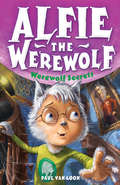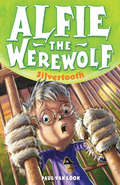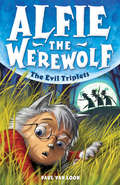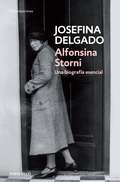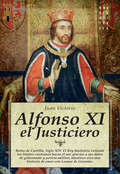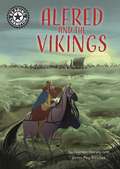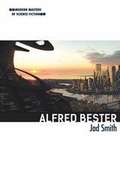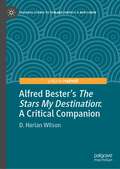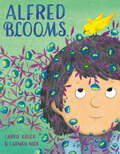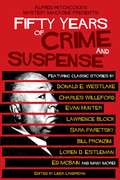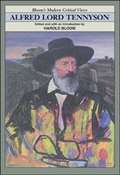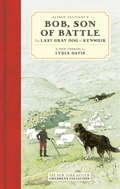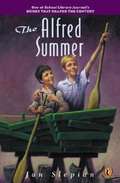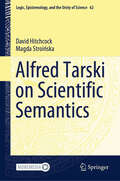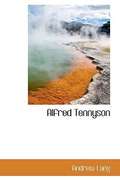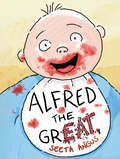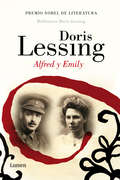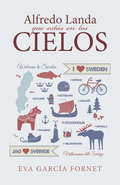- Table View
- List View
Alfie the Werewolf: Werewolf Secrets
by Paul Van LoonAlfie and his friends are on holiday. A break from all the werewolf mysteries and spooky goings on? No chance! When Alfie discovers a creepy old house full of mysterious portraits and a family tree that features his name he has to investigate ... and what he finds is a group of orphan werewolves under the control of crazy lady Mooma. Can Alfie help them and avoid getting captured too?
Alfie the Werewolf 3: Silvertooth
by Paul Van LoonWhen a mysterious stranger suddenly turns up claiming to be Alfie's guardian, Alfie's happy days living with Tim's family are over. Soon, Alfie's trapped in a cage with a grouchy vampire and a mysterious creature called a scoffle. He's been 'collected' by werewolf hunter, Sebarino Silvertooth, who is capturing extraordinary creatures in order to sell them to researchers.Can Tim and his parents, with the help of Grandpa Werewolf and Noura, help Alfie escape before he ends up in a lab?
Alfie the Werewolf 5: The Evil Triplets
by Paul Van LoonAlfie is enjoying life as a werewolf - until his crazy, werewolf-hating neighbour, Mrs Chalker, arrives back in town. And she appears to have turned over a new leaf. Can Alfie trust her? Then things gets even more suspicious when two Mrs Chalker lookalikes are spotted carrying a rowing boat through the forest. There can't be three Mrs Chalkers, can there?Alfie is on his guard, but too late he discovers that the Mrs Chalkers are all part of a club dedicated to eradicating all werewolves. Alfie better watch his hairy werewolf back...
Alfie's Castle: Independent Reading Blue 4 (Reading Champion #469)
by Jackie WalterWhen Alfie gets a brick castle for his birthday, he can't wait to get started building it! But Mum, Dad and Grandad all have trouble assembling their parts ... until Alfie discovers how to solve the problem. If they work as a team, they can build the best castle ever!Reading Champion offers independent reading books for children to practise and reinforce their developing reading skills.Fantastic, original stories are accompanied by engaging artwork and a reading activity. Each book has been carefully graded so that it can be matched to a child's reading ability, encouraging reading for pleasure.
La alfombra del príncipe (¡Arriba la Lectura!, Level L #1)
by Jacqueline Greene Katya KreninaUnos ladrones capturan al príncipe Jabib cuando sale a montar a caballo. El príncipe astuto ofrece fabricar alfombras para que los ladrones las vendan. ¿Logrará escapar de la cueva con su habilidad para tejer alfombras? NIMAC-sourced textbook
ALFONSINA STORNI (EBOOK)
by Josefina DelgadoAlfonsina Storni nació en el mar, a bordo del barco en el que viajaban sus padres. Pionera de la liberación femenina en la Argentina, perteneció a la misma generación de Victoria Ocampo y, sin embargo, no se cruzaron nunca. En su poesía se destaca la audacia de los temas, principalmente la perspectiva femenina del amor. Pero tanto su obra como su vida impactan por su postura indeclinable frente a los convencionalismos de la primera mitad del siglo XX. Su final trágico la muestra como una mujer excepcional, en la que el carácter triunfa por encima de las normas sociales. Rigurosa en la documentación y amena en el relato, Alfonsina Storni. Una biografía esencial capta con maestría la fuerza de la mujer y el talento de la escritora.
Alfonso XI, el Justiciero (Historia Incógnita)
by Juan VictorioEn 1312 muere Fernando IV y la corona pasa a su hijo Alfonso XI que tiene apenas un año de edad. Mientras crece, Castilla conoce una de las etapas más negras de su historia debido a la rapacidad de la alta nobleza, que se había encargado de su tutoría.
Alfred and the Vikings: Independent Reading 18 (Reading Champion #455)
by Damian HarveyWhen Vikings arrive and invade, King Alfred summons the Anglo-Saxons to fight. This true story of the famous defeat of the Vikings is brought to life through the eyes of Alfred's squire, who witnesses Alfred's bravery first hand.This first colour chapter book is a perfectly levelled, accessible text for Key stage 2 readers aged 10-11 or in year 6. Reading Champion offers independent reading books for children to practise and reinforce their developing reading skills.Fantastic, original stories are accompanied by engaging artwork and activities to provoke deeper response and encourage writing. Each book has been carefully graded so that it can be matched to a child's reading ability, encouraging reading for pleasure.The Key Stage 2 Reading Champion Books are suggested for use as follows:Independent Reading 11: start of Year 3 or age 7+Independent Reading 12: end of Year 3 or age 7+Independent Reading 13: start of Year 4 or age 8+Independent Reading 14: end of Year 4 or age 8+Independent Reading 15: start of Year 5 or age 9+Independent Reading 16: end of Year 5 or age 9+Independent Reading 17: start of Year 6 or age 10+Independent Reading 18: end of Year 6 or age 10+
Alfred Bester
by Jad SmithAlfred Bester's classic short stories and the canonical novel The Stars My Destination made him a science fiction legend. Fans and scholars praise him as a genre-bending pioneer and cyberpunk forefather. Writers like Neil Gaiman and William Gibson celebrate his prophetic vision and stylistic innovations. Jad Smith traces the career of the unlikeliest of SF icons. Winner of the first Hugo Award for The Demolished Man , Bester also worked in comics, radio, and TV, and his intermittent SF writing led some critics to brand him a dabbler. In the 1960s, however, New Wave writers championed his work, and his reputation grew. Smith follows Bester's journey from consummate outsider to an artist venerated for foundational works that influenced the New Wave and cyberpunk revolutions. He also explores the little-known roots of a wayward journey fueled by curiosity, disappointment with the SF mainstream, and an artist's determination to go his own way.
Alfred Bester’s The Stars My Destination: A Critical Companion (Palgrave Science Fiction and Fantasy: A New Canon)
by D. Harlan WilsonIn this comprehensive study of The Stars My Destination, D. Harlan Wilson makes a case for the continued significance of Alfred Bester’s SF masterwork, exploring its distinctive style, influences, intertextuality, affect, and innovation as well as its extensive metafictional properties. In Stars, Bester established himself as a son of the pulp-SF and high-modernist writers that preceded him and a forefather to the New Wave and cyberpunk movements that followed his lead. Wilson’s study depicts Bester as an SF insider as much as an outlier, writing in the spirit of the genre but breaking with the fixation on hard science in favor of psychological interiority, literary experimentation, and adult themes. The book combines close-readings of the novel with broader concerns about contemporary media, technoculture, and the current state of SF itself. In Wilson’s view, SF is a moribund artform, and Stars foresaw the inevitable science fictionalization of our benighted world. With scholarly lucidity and precision, Wilson shows us that Stars pointed the way to what we have (un)become.
Alfred Blooms
by Carrie KruckShy Alfred wants to befriend the girl whose yard is filled with other kids and flowers but he doesn't know how. When Alfred sees Lulu&’s magical yard filled with flowers and friends, he&’s sure that if he can cultivate a beautiful garden, friends will flock to join him. Alfred tries but nothing grows in his brown patch of dirt. Determined to make one last attempt, Alfred heads to the store to buy fresh flower seeds. As he hurries home, he sneezes—and the seeds fly everywhere! And this time they begin to grow wherever they land—in his pockets, in his hair, even in his ears! A very discouraged Alfred gets stuck in the mud. But the aroma of warm blueberry muffins coming from a nearby bakery reminds him of Lulu&’s favorite treat and, tucking the flowers under his hat, he heads there. Alfred shares muffins with Lulu and finds out that he doesn&’t need a garden; time spent together is the best way to make a friend. This charming friendship story is sensitive and delightful with just a touch of whimsy.
Alfred Hitchcock Presents: Stories That Scared Even Me
by Alfred Hitchcock17 short stories by a variety of authors, the novelette It by Theodore Sturgeon, and the novel Out of the Deeps by John Wyndham.
Alfred Hitchcock's Home Sweet Homicide
by Cathleen JordanThe top names in mystery fiction come together in an anthology of home-based crime stories that derive from adultery, inheritance, and other family situations.
Alfred Hitchcock's Most Wanted
by Cathleen Jordan21 short stories from Alfred Hitchcock's Mystery magazine, 1980-1985.
Alfred Hitchcock's Mystery Magazine Presents Fifty Years of Crime and Suspense
by Linda LandriganFrom Ed McBain to Sara Paretsky: a celebration of over fifty years of mystery masterworks. For over fifty years, Alfred Hitchcock’s Mystery Magazine has been one of the foremost magazines of mystery and suspense. This celebratory anthology features such bestselling writers as Lawrence Block, Ed McBain, and Jan Burke, just three of the esteemed contributors to have appeared in the magazine’s pages over the past five decades. This impressive anthology reflects the diversity of every issue of the magazine: historicals and police procedurals, cozies and noirs, humor and suspense. From Jim Thompson in the fifties and Donald Westlake in the sixties, to recent stories by S. J. Rozan, Martin Limon, and Rhys Bowen, this anthology documents over a half century of superb storytelling.
Alfred Hitchcock's The Shadow of Silence
by Cathleen JordanThis book is a collection of 28 short stories written by different authors representing Alfred Hitchcock's genre.
Alfred Hitchcock's Shrouds and Pockets
by Cathleen JordanThis book is a collection of 29 short stories written by different authors representing Alfred Hitchcock's genre.
Alfred Lord Tennyson
by Harold BlooomEssays by T. S. Eliot, G. M. Young, Cleanth Brooks, Marshall McLuhan, Robert Langbaum, Christopher Ricks, John Rosenberg, John Hollander, Harold Bloom, A. Dwight Culler, and Robert Bernard Martin.
Alfred Ollivant's Bob, Son of Battle
by Lydia Davis Marguerite Kirmse Alfred OllivantBob, Son of Battle, is a sheepdog so canny and careful of his flock, so deeply devoted to his master, James Moore, and so admired for his poise and wisdom by the residents of a small village in the rugged mountains of England's North Country, that young though he is, he is already known as Owd Bob. In a recent contest, Bob has proved himself a matchless sheepdog, and if he wins the trophy two more times, he'll be seen as equal to the legendary sheepdogs of yore. But Bob has a real rival: Red Wull, with his docked tail and bristling yellow fur, a ferocious creature, just like his diminutive master, Adam McAdam, a lonely Scot, estranged not only from his English neighbors but from his son, David. McAdam just can't stop belittling this strapping young man, all the more so since David began courting Moore's beautiful daughter Maggie. But what McAdam really wants is for his beloved Wullie to wrest the prize from Bob once and for all. The story takes a darker turn when a troubling new threat to the local flocks emerges. A dog has gone rogue, sneaking out at night to feast on the flesh and blood of the sheep he is bound to protect. Again and again, new sheep fall prey to this relentless predator; again and again, he slips away undetected. This master hunter can only be among the boldest and sharpest of dogs . . . Bob, Son of Battle has long been a beloved classic of children's literature both in America and in England. Here the celebrated author and translator Lydia Davis, who first read and loved this exciting story as a child, has rendered the challenging idioms of the original into fluent and graceful English of our day, making this tale of rival dogs and rival families and the shadowy terrain between Good and Bad accessible and appealing to readers of all ages.
The Alfred Summer
by Jan Slepian<P>No one understands them- but they understand each other. <P>Lester's smart, handsome, and thoughtful-but he has cerebral palsy, and that's all anyone sees. It's the same for Alfred, Claire, and Myron. Alfred is incredibly honest and kind; Claire pulls no punches; Myron makes sure that everyone is taken care of. On the outside, though, Alfred is "slow," mentally challenged; Claire is a tomboy; and Myron is overweight and clumsy. <P>The four meet and quickly band together, and soon they're working on an amazing project: The Getaway, a full-size boat they're building" in Myron's basement. Can four misfits make something beautiful to show the world? Can they enjoy approval from their parents and kids their age, going out without being made fun of, freedom, laughs and accomplishments other kids seem to take for granted? <P>Alfred's summer is a summer of close calls, hard falls, good times and tough times and life getting more worthwhile and exciting.
Alfred Tarski on Scientific Semantics (Logic, Epistemology, and the Unity of Science #62)
by David Hitchcock Magda StroińskaThis book tells the story of the landmark event in modern logic whereby Alfred Tarski became “the man who defined truth”. Alfred Tarski’s classic monograph on truth became known internationally in 1935, when he presented its ideas in German at an international conference and collaborated in preparation of its German translation. This book provides the first English translation of the Polish version of Tarski’s conference paper, which for purposes of comparison is printed side-by-side with a new exact English translation of the German version. It offers for the first time a comprehensive and detailed analysis of the paper, and for the first time a description and analysis of the discussion of the paper immediately after its presentation. It discusses 22 substantive differences between the two versions. The book also extracts from recently discovered correspondence about the German translation of the truth monograph how it was decided to produce such a translation, the process of vetting and changing the translation, changes requested by Tarski, objections to the appeal to intuition in the Polish original (supported by a list of those appeals with their replacements in the German and English translations), other translational issues, discrepancies other than those concerning appeals to intuition between the Polish original and its German translation, the “Keystone cops” saga of Tarski’s off-prints, and monetary matters. It lists from Tarski’s journal his skiing, mountaineering and tourist trips in 1935, and describes his companions on those trips. An electronic supplement translates or summarizes the complete correspondence, with comments, and includes images from Tarski’s journal of his itineraries of his 1935 trips, with the editors' explanatory comments.
Alfred Tennyson
by Andrew LangINTRODUCTION. IN writing this brief sketch of the Life of Tennyson, and this attempt to appreciate his work, I have rested almost entirely on the Bio- graphy by Lord Tennyson with his kind per- mission and on the text of the Poems. <P> <P> As to the Life, doubtless current anecdotes, not given in the Biography, are known to me, and to most people. But as they must also be familiar to the author of the Biography, I have not thought it desirable to include what he rejected. The works of the localisers I liave not read Tennyson disliked these researches, as a rule, and they appear to be unessential, and often hazardous. The professed commentators I have not consulted. It appeared better to give ones own impressions of the Poems, unaffected by the impressions of others, except in one or two cases where matters of fact rather than of taste seemed to be in question. Thus on two or three points I have ventured to differ from a distinguished living critic, and have given the reasons for my dissent. . .
Alfred the Great
by Seeta AngusBaby Alfred loves his food, But too much of anything isn’t good! Chocolate mice may be his treat, But is there something magical in that sweet? Alfred is a baby whose tummy grows at an alarming rate, but Mum and Dad just keep feeding him. Read the story and laugh at this funny tale, full of silly nonsense and overflowing with bottles of milk and food! Be on the lookout in the near future for Katherine the Great, Alfred’s baby sister, coming soon!
Alfred y Emily
by Doris LessingDoris Lessing ha querido rendir un homenaje a sus padres, imaginando qué hubiera sido de su vida si la Primera Guerra Mundial no hubiese truncado el porvenir de la joven pareja. El peso del conflicto fue como un castigo que planeó sobre la pequeña Doris desde su infancia, "Aquí estoy intentando escapar de esta monstruosa herencia, intentando ser libre", escribe la autora. Para conseguirlo, en la primera parte del libro Lessing inventa para sus padres una vida donde no hubiera existido la guerra, y en la segunda cuenta cómo fue su vida en realidad, primero en Inglaterra y luego en África, intercalando en las páginas del texto unas viejas fotos familiares."Si ahora pudiera conocer a Alfred y Emily sin la pesadilla de la guerra, creo que estarían contentos de la vida que he imaginado para ellos", acaba diciendo Lessing en estas páginas.Ficción y autobiografía a la vez, acertada amalgama de imaginación y recuerdos, la novela más reciente de esta gran narradora demuestra una vez más el talento de una mujer que, a sus noventa años, sabe describir su propia vida como si de un cuento se tratara."Se supone que, llegados a cierta edad, dejamos de innovar, pero Doris Lessing es excepcional y nos sorprende una vez más."The Guardian
Alfredo Landa que estás en los cielos
by Eva García FornetNovela de la emigración y del desarraigo. Los países escandinavos analizados desde cerca. Tragicomedia de unas vacaciones. <P><P> Un padre visita a su hija emigrante en la nueva Suecia muy lejos ya del paraíso socialdemócrata de épocas anteriores.
